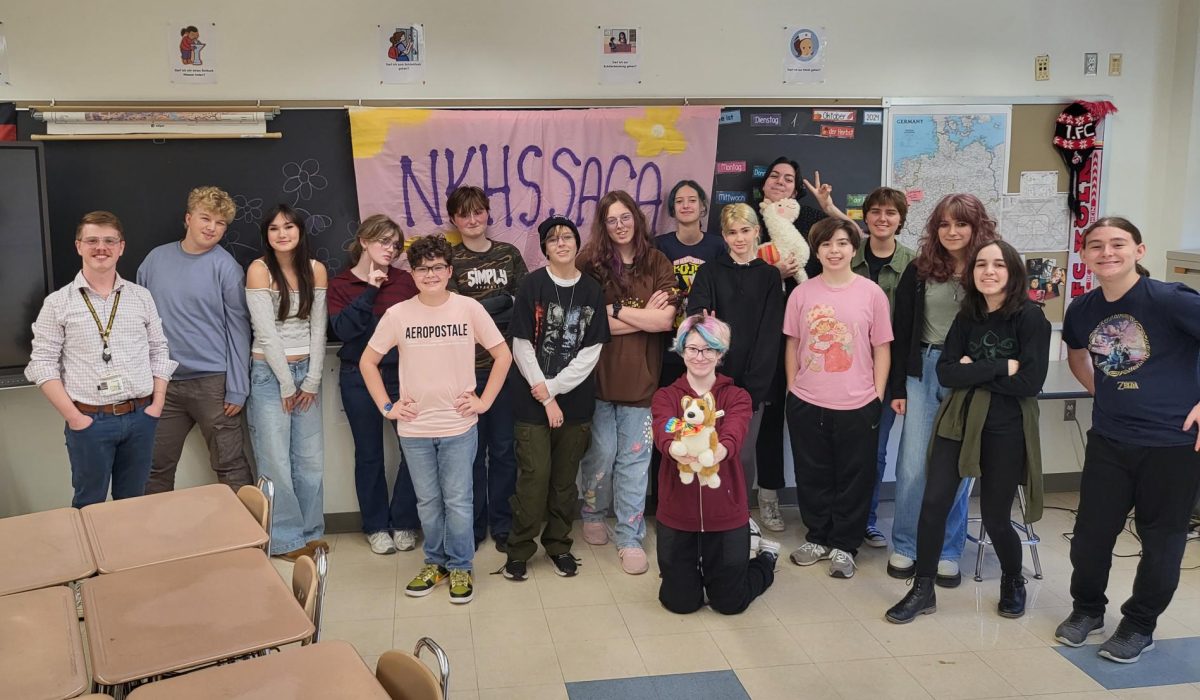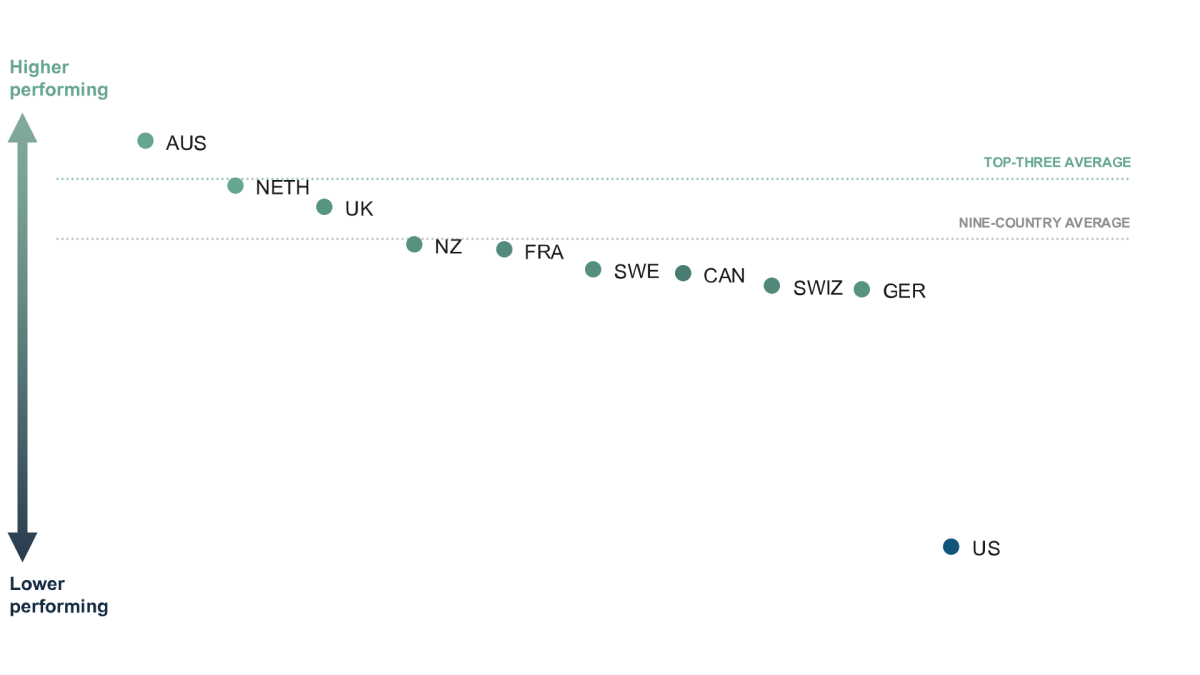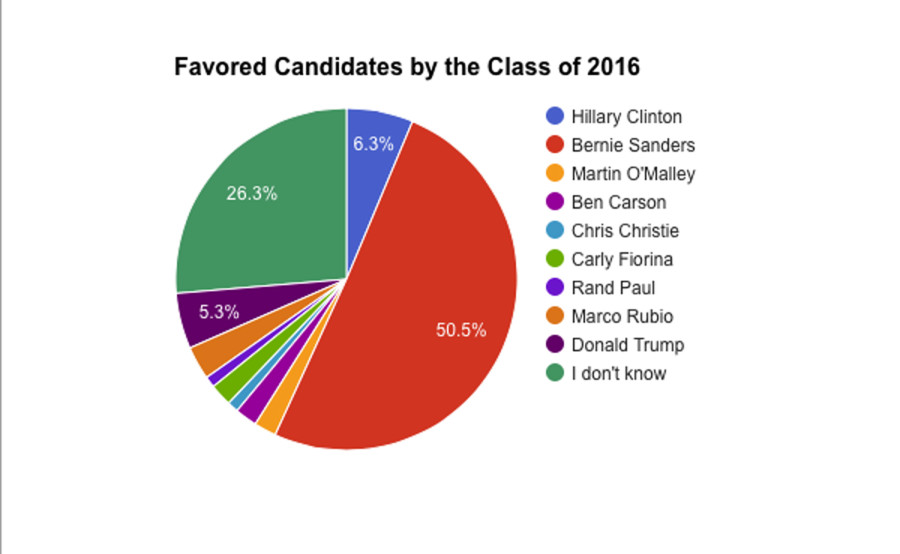Eighteen and powerful
Seniors discuss the right to vote
You’re finally 18 years old! What freedom you have! You can go to rated R movies, sign out of school on your own accord, and oh, that’s right, vote!
The majority of this year’s senior class will be eligible to vote in 2016 in the 45 United States presidential elections. Whether they believe the next president should be U.S. Senator Bernie Sanders, Dr. Ben Carson, or businessman Donald Trump, their opinion and vote will shape the country for the next four years.
Many students have been waiting for their moment to vote, like senior Eric Rosdahl. “I have been very excited for the upcoming elections considering I will be legal to vote,” said Rosdahl. “I share a passion for politics and hope to study political science in college. I think it is incredibly cool that I will be able to now have a say in our government process.”
In 2010, only 24% of eligible young voters ages 18 through 29 voted in midterm elections.
According to Christina Grier, a writer for FairVote.org, young voters hold the key to the country’s future. “When young voter turnout is low, it decreases accountability of elected government officials, decreases the quality of discourse in the community and through the media, and decreases opportunities to have full representation of elected leaders working for the interests of the youth in government,” Grier said in: America’s Young Voters: Who They Are and Why They Matter.
According to Eva Guidarini of the Harvard Institute of Politics, it’s looking even worse this year; only 23 % of voters under the age 30 are expected to vote.
“The young vote in this country has never been very strong, but it really should be,” said senior Tracy Kurdziel. “After all it is our future that will be affected by the people we elect into office. Many of the presidential candidates have very strong views on things that will affect our lives and we need to make sure that we agree with how [they intend to deal with these issues].”
The strength of democracy is dependent on votes. The government indirectly and directly influences almost every aspect of our lives, and young voters have the potential to significantly influence the results of each election.
The senior class includes a number of opinionated students who are highly informed about politics; many attend Junior States of America meetings with Serena Mason on Thursdays after school. Voicing their opinions on the upcoming elections and actually being able to take action by doing so is something that many have looked forward to.
As our generation of young voters start to vote, they need to become educated on the views and goals of each candidate.
Currently, the Democratic candidates are U.S. Senator Bernie Sanders, former U.S. Secretary of State Hillary Clinton, and former Governor Martin O’Malley. The top three Republican candidates are businessman Donald Trump, Dr. Ben Carson, and U.S. Senator Marco Rubio (several other Republican candidates are also running.) Each party will eventually choose a nominee, and the two nominees will compete in the general election.
“I will be voting for Bernie Sanders because he has really stuck to most of his ideals for most of his political career,” said Kurdziel. “He has very good progressive views on women’s rights and college prices that I agree with.”
Sanders is a strong advocate of the middle class, gender and racial equality, LGBT rights, and much more. He promises to raise the minimum wage, make public colleges and universities tuition free throughout America, and sign the Paycheck Fairness Act into law to end wage discrimination based on gender. He also hopes to expand funding for Planned Parenthood, the Title X family planning program, and other initiatives. In relation to the problem with ISIS, he wants to move away from a policy of unilateral military action towards a policy with a focus on diplomacy, and ensuring the decision to go to war is a last resort.
“I would vote for Hillary Clinton because she is a seasoned politician who is willing to compromise with the Republican voters and elected officials,” said senior Siddarth Koppaka. “Though she is more conservative than Sanders, Clinton still hold true to most liberal values, has experience with foreign policy under her time as Secretary of State, can argue her points better than the other two candidates in the Democratic debates, has lived in the White House before and knows how it should be run, is a strong and even stubborn, and won’t let herself be pushed around.”
Clinton supports a clean America, helping those who are at a disadvantage, LGBT rights and gender, and racial equality. She believes in helping the middle class and the disadvantaged while enacting her idea of “strong growth, fair growth, and long term growth.” For her “strong growth” plan, Clinton wants to make America clean again and fight pollution, make community-college tuition free, and cut the interest rate on student loans in half. She hopes to expand employment opportunities and provide tax relief on both small businesses and the middle class. For her “fair growth” plan, Clinton plans on raising minimum wage, strengthen the Affordable Care Act and invest in early childhood programs that will ensure every child access to a high-quality preschool. For her “long term growth” plan, she wants to increase workers’ pay, benefits, and training, impose accountability on Wall Street, and lower healthcare costs.
“I like and may vote for O’Malley because I like how he wants to allow loan forgiveness for college debt,” said senior Cameron Poe. “[I also like how he] wants to make America more dependent on clean energy rather than using fossil fuels.”
O’Malley, the third Democratic candidate, has a number of goals to achieve as president. O’Malley wants to increase American families’ median net worth by $25,000 in ten years, generate 100 % of American electricity with renewable energy by 2050, and cut the unemployment rate among young people in half in the next three years. He also wants to place 11 million new Americans on the pathway to citizenship through comprehensive immigration reform, ensure that all higher education students have the option to graduate debt-free within five years, and cut deaths from gun violence in half.
“The candidate of my choice would most likely be Trump,” said senior Zach Fontes. “This is mainly due to his financial success which should, in theory, influence the current state of our deficit.”
Trump is known mainly for his vigorous methods of handling immigration and his focus on putting the needs of the working people first. He wants Mexico to pay and build a wall between the United States and Mexico to stop the flood of illegal immigrants coming into this country. Trump is also a strong believer in protecting the second Amendment and wants to bring back Project Exile and fix the broken mental health system. Trump also says he will remove income tax on any single person making less than 25,000 a year or a married couple making 50,000 a year.
“Honestly, it is hard to make a choice,” said Chris Squillante, senior. “Many of these candidates are either extremely conservative or extremely liberal. But I did find a man who is somewhat in the middle, his name is Ben Carson. He opposes free trade and wants to end the Common Core system by endorsing private education. He opposes abortion, [and he also] wants cameras issued on every police officer vest.”
Carson is a proud supporter of pro-life and is devoted to protecting and enhancing the lives of families and their children. He also wants to keep Gitmo open and strongly believes in protecting the second Amendment. Carson also hopes to create a better tax code by creating what he calls a “fairer, simpler, and more equitable tax system” and he hopes to lower the debt in the United States by ratifying a “Balanced Budget Amendment” to the Constitution. Carson is also against ObamaCare and strongly supports Health Savings Accounts (HSAs), which empowers families to make their own decisions about their medical treatment.
“I’ve seen the presidential debates and out of all the candidates [Marco Rubio] seems like the most genuine,” said senior Jeff Dowling. “He seems like he really cares about everyone, not just America, and he doesn’t fall into the trap that all the other candidates do; talking all about themselves and what they’ve done rather than what they will do and how they will go about helping fulfill their plans.”
Rubio, the third major Republican candidate, plans on promoting strong families, protecting the second Amendment, farmers, and senior citizens, and helping out the workers in America, the veterans, and small business owners. He hopes to create a new $2,500 per child partially refundable tax credit and ending the marriage tax penalty without penalizing homemakers, fight excessive application of the Endangered Species Act and end the death tax, carbon tax, and bring down energy costs for farmers. Rubio also plans on protecting Medicare and social security for current citizens in or near retirement, and plans on gradually increasing the retirement age. and repealing Obamacare and strengthening Medicare Advantage. As president he also wants to cut taxes for small businesses to 25% and creating a higher-ed reform that will offer veterans more flexible, up-to-date options for higher education.
Whether you are voting Rubio, Sanders, or O’Malley; your vote matters. It is a chance to involve yourself in the democracy that many are not lucky enough to have and shape the country you live in.
“Voting is your voice, strength, and right,” said U.S. History II teacher Ms. Mason. “Why would anyone purposely elect to deny themselves the opportunity to weigh in at the ballot box? It is what makes our nation unique as we don’t need a revolution in the streets, we have one every four years at the ballot box, and in case of the 2016 Presidential election, in less than 11 months. Young Americans need to show up and make their voices heard or politicians will continue to ignore you and the issues that are near and dear to your hearts.”
Your donation will support the student journalists of North Kingstown High School. Your contribution will allow us to distribute a print edition of the Current Wave to all students, as well as enter journalism competitions.











